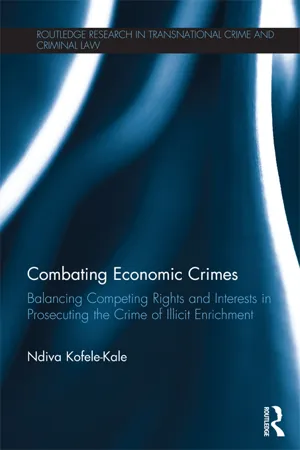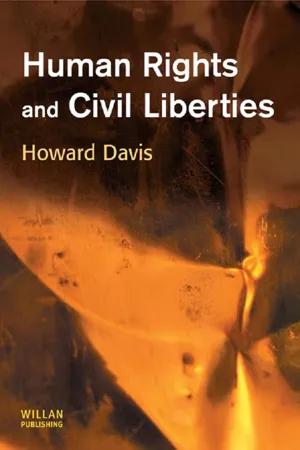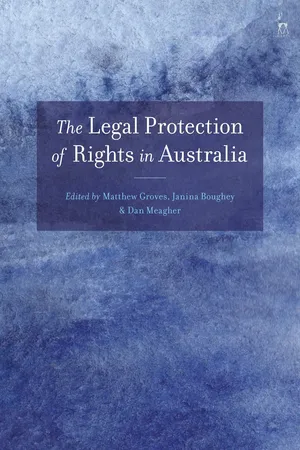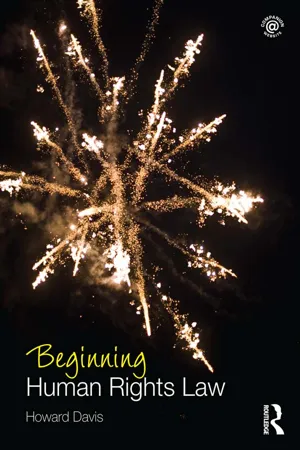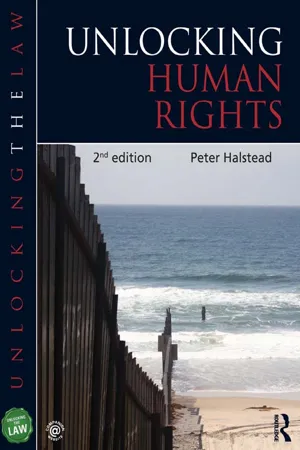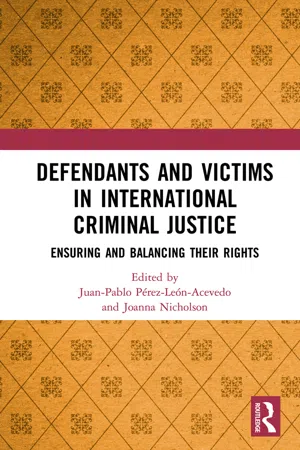Right to a Fair Trial
The right to a fair trial ensures that individuals are entitled to a legal process that is impartial, just, and transparent. This includes the right to be heard, the right to legal representation, and the right to a speedy trial by an independent and impartial tribunal. It is a fundamental human right enshrined in various international and national legal systems.
8 Key excerpts on "Right to a Fair Trial"
- eBook - ePub
Combating Economic Crimes
Balancing Competing Rights and Interests in Prosecuting the Crime of Illicit Enrichment
- Ndiva Kofele-Kale(Author)
- 2013(Publication Date)
- Routledge(Publisher)
...4 The Right to a Fair Trial in international and domestic law What does the Right to a Fair Trial entail and where do the presumption of innocence, the right to silence and the privilege against self-incrimination fit in? Lord Diplock answered the first part of this question in his now famous dictum, “[t]he fundamental human right is not to a legal system that is infallible, but to one that is fair.” 1 Fairness in a trial boils down to the question whether the accused has had a fair chance of dealing with the allegations against him. 2 Judge Patrick Robinson, President of the United Nations International Tribunal for the Former Yugoslavia, describes the Right to a Fair Trial as an ancient right whose roots can be traced all the way back to the Lex Duodecim Tabularum —the Law of the Twelve Tables—which, as he points out, “was the first written code in the Roman Republic.” 3 The principles of law codified in the Law of the Twelve Tables—the right to have all parties present at a hearing, the equality of all before the law, and the impartiality of the courts—are echoed in modern jurisprudence as essential elements to the conduct of a fair trial. 4 The scope of the Right to a Fair Trial has been the subject of sustained and progressive development from the Magna Carta and the French Declaration of the Rights of Man to the constitution of the first “new nation.” 5 Its content has also been shaped by the doctrines and institutions established during the Age of Enlightenment as well as in the...
- eBook - ePub
- Howard Davis(Author)
- 2013(Publication Date)
- Willan(Publisher)
...Right to a Fair Trial In the determination of his civil rights and obligations or of any criminal charge against him, everyone is entitled to a fair and public hearing within a reasonable time by an independent and impartial tribunal established by law. Judgment shall be pronounced publicly but the press and public may be excluded from all or part of the trial in the interests of morals, public order or national security in a democratic society, where the interests of juveniles or the protection of the private life of the parties so requires, or to the extent strictly necessary in the opinion of the court in special circumstances where publicity would prejudice the interests of justice. Everyone charged with a criminal offence shall be presumed innocent until proved guilty according to law. Everyone charged with a criminal offence has the following minimum rights: to be informed promptly, in a language which he understands and in detail, of the nature and cause of the accusation against him; to have adequate time and facilities for the preparation of his defence; to defend himself in person or through legal assistance of his own choosing or, if he has not sufficient means to pay for legal assistance, to be given free when the interests of justice so require; to examine or have examined witnesses against him and to obtain the attendance and examination of witnesses on his behalf under the same conditions as witnesses against him; to have the free assistance of an interpreter if he cannot understand or speak the language used in court. The Right to a Fair Trial is absolute in the sense that a trial in violation of Article 6 is unlawful. A criminal conviction, for example, should be set aside. 16 The basic guarantee is to a fair trial. What this requires involves, first, a number of express rights as identified in Article 6(1), (2) and (3)...
- eBook - ePub
- Matthew Groves, Janina Boughey, Dan Meagher, Matthew Groves, Janina Boughey, Dan Meagher(Authors)
- 2019(Publication Date)
- Hart Publishing(Publisher)
...16 A Fair Trial for Accused Terrorists REBECCA ANANIAN-WELSH * Australia may lack a constitutional due process clause, but fair trial principles are protected by common law rules, numerous statutes, the principle of legality, the inherent powers of courts and, implicitly at least, the constitutional separation of powers. These layers of protection reflect the centrality of the fair trial to the liberal democratic system grounded in the rule of law. They have also evolved out of centuries of judicial responsiveness to the ‘limitless ways in which the due administration of justice can be delayed, impeded or frustrated’. 1 This chapter focuses on three key challenges to the fair trial that have arisen in the criminal trials of accused terrorists. It examines how courts have responded to these concerns by ‘balancing’ fairness and security. I draw in particular on Australia’s largest terrorism prosecution to date: the 2007–2008 trial of Abdul Nacer Benbrika and his 11 co-accused. In this trial, secret evidence, courtroom security measures and severe conditions of imprisonment (amongst other things) undermined the fair trial rights of these accused people. From this analysis, the inherent jurisdiction of courts emerges as a particularly effective, practical and useful vehicle for the protection of fair trial rights. However, this loosely defined, highly discretionary set of powers is not without its weaknesses. I. The Fair Trial The requirement for disputes to be determined by a fair process is globally recognised as a fundamental human right. Article 14(1) of the International Covenant on Civil and Political Rights states: All persons shall be equal before the courts and tribunals...
- eBook - ePub
- Howard Davis(Author)
- 2014(Publication Date)
- Routledge(Publisher)
...This is central to the rule of law and it is what distinguishes the administraton of justice in a decent society from the show trials of dictatorships. A Right to a Fair Trial is, therefore, widely recognised. It is implied by Magna Carta (1215). It is an important feature of written constitutions (such as the US Constitution, 1789, which requires ‘due process’ of law). Likewise it is an important principle of international law, expressed in the UN Declaration of Human Rights (Articles 10 and 11) and given fuller legal effect by the International Covenant on Civil and Political Rights (Article 14). UK LAW: ARTICLE 6, THE HRA AND THE COMMON LAW In the European Convention on Human Rights, Article 6 gurantees the ‘Right to a Fair Trial’ to claimants in civil cases and to defendants in criminal trials. Article 6 rights are, of course, given effect in UK law through the terms of the Human Rights Act 1998 (HRA). Procedures before the courts and tribunals of the UK tend to be found in: • primary legislation (such as the Senior Courts Act 1981, the Police and Criminal Evidence Act 1984) or the Tribunals Courts and Enforcement Act 2007, • secondary legislation (such as the Civil Procedure Rules or the tribunal rules). Section 3 HRA requires this primary and secondary legislation to be interpreted consistently with Article 6 (unless it is really impossible)...
- eBook - ePub
- Peter Halstead(Author)
- 2014(Publication Date)
- Routledge(Publisher)
...7 Right to a Fair Trial AIMS AND OBJECTIVES At the end of this chapter you should be able to: Appreciate the role the common law plays in ensuring fair treatment in criminal trials and civil litigation Understand the importance of fair process to people arrested on suspicion (although note that the chapter does not deal with the Police and Criminal Evidence Act (PACE) and codes which are covered in Chapter 6.3) Be aware of the full scope of Article 6 of the ECnHR with its fundamental assumption of innocence until proved guilty and the minimum rights available under Article 6(3) to everyone charged with a criminal offence Appreciate the importance of the principle of no punishment without law established by Article 7 of the Convention 7.1 Trials and hearings It should be noted that although the rubric of Article 6 refers to ‘Right to a Fair Trial’ this is something of a misnomer because the Article deals with determination of civil rights and obligations as well as criminal charges, and in the civil context it is more appropriate to refer to ‘hearings’ rather than ‘trials’. The ‘Right to a Fair Trial’ is part and parcel of the broader rights requirement of fair process, and includes Article 7 which deals with the principle of no punishment without law and other aspects of due process such as rules of natural justice. 7.2 Background The ways in which English law has dealt with trials over the centuries would comprise a study in itself, but two brief examples can be shown to provide an indication of how some of these ancient provisions still have resonance in the twenty-first century. 7.2.1 Magna Carta (1215) This seminal constitutional document was concerned with privileges conceded by the Crown, mostly to earls and barons and less so to freemen, but it is often assumed nowadays to be the origin of a variety of rights and privileges enjoyed by everyone subject to English law, even though the bases upon which the Charter’s provisions were made are long gone...
- eBook - ePub
Defendants and Victims in International Criminal Justice
Ensuring and Balancing Their Rights
- Juan Perez-Leon-Acevedo, Joanna Nicholson(Authors)
- 2020(Publication Date)
- Routledge(Publisher)
...4 Balancing prejudice Fair trial rights and international procedural decisions relating to evidence Rogier Bartels * * The views expressed in this contribution are the author’s and do not necessarily reflect does of the International Criminal Court. Introduction Despite the gravity of the alleged conduct in cases of aggression, genocide, crimes against humanity, or war crimes, it is – fortunately 1 – undisputed that a person accused of having committed international crimes is entitled to receive a fair trial. Shortly before the birth of international criminal law, 2 Winston Churchill favoured summary execution of all (alleged) German war criminals, referring to fair trial rights as ‘complications’. 3 However, the Charter of the International Military Tribunal at Nuremberg, adopted a few months later, did include several provisions ‘to ensure fair trial for the Defendants’. 4 At the International Criminal Tribunal for the former Yugoslavia (ICTY), the trial chambers had to ‘ensure that a trial is fair and expeditious and that proceedings are conducted […] with full respect for the rights of the accused’, as stated in Article 20 of the Tribunal’s Statute. 5 The International Criminal Court (ICC or Court), on which this contribution focusses, naturally also acknowledges the accused’s Right to a Fair Trial. The Court’s legal texts do not explicitly refer to this right as such, but its various components are incorporated in several provisions of the Rome Statute of the International Criminal Court (Rome Statute), 6 such as Articles 22, 7 23, 8 55, 9 and 67. 10 In addition, some provisions of the Rome Statute more generally address the need for trial to be ‘fair’ 11 or refer to associated concepts, for instance the ‘integrity of the proceedings’. 12 However, as discussed below, the phrase ‘integrity of the proceedings’, as well as the phrase ‘in the interests of justice’, are often used to justify the placing of certain limitations on the rights of an accused...
- eBook - ePub
The Politics of the Common Law
Perspectives, Rights, Processes, Institutions
- Adam Gearey, Wayne Morrison, Robert Jago(Authors)
- 2013(Publication Date)
- Routledge-Cavendish(Publisher)
...Central to the notion of the fair trial is the idea that the plaintiff or defendant should be able to present his or her case ‘effectively’ – and that this required ‘equality of arms’ – in other words – that there should not be, as there was in this case, an unequal access to legal resources and representation. The legal aid scheme provided just such an equality of arms. However, whether or not legal aid was required had to be determined on the facts of each case. Important determining factors were the complexity of the issues raised, and the extent to which the applicant was able to represent him or herself. 81 This was not to say, of course, that there is an absolute right to legal aid. Any restrictions on this right, however, had to be both legitimate and proportionate. Acceptable factors included chances of success and the financial means of the person applying for legal aid. This meant that it was not necessary that ‘complete equality of arms’ be maintained – but what was important was that both parties to the action had a ‘reasonable opportunity’ to present his or her case – in such conditions that one party was not at a ‘substantial disadvantage’ in relation to the other. 82 On the facts of the present case, the ECtHR determined that legal assistance would have been necessary to ensure a fair trial. This was because the defendants were defending their right to freedom of expression in an action that raised many complex points of law. Moreover, the financial consequences for the applicants in losing the case were significant. Although the applicants had proved themselves to be articulate, and did receive pro bono work from lawyers – this was not sufficient to ensure a fair trial...
- eBook - ePub
Human Rights Law in Europe
The Influence, Overlaps and Contradictions of the EU and the ECHR
- Kanstantsin Dzehtsiarou, Theodore Konstadinides, Tobias Lock, Noreen O'Meara, Kanstantsin Dzehtsiarou, Theodore Konstadinides, Tobias Lock, Noreen O'Meara(Authors)
- 2014(Publication Date)
- Routledge(Publisher)
...30, at 1828; Groussot, Lock and Pech, n. 45, at 9, para. 2.2.2; Weiß, n. 25, at 95. 55 In similar manner, see Murray, n. 26, at 1393 and at 1399–1400. 56 As decisively put forward in Bosphorus, ‘[s]ince the Convention establishes a minimum level of protection (Article 53), any equivalence between it and the Community’s protection can only ever be in terms of the means, not of the result.’ See, Joint concurring opinion of Judges Rozakis, Tulkens, Traja, Botoucharova, Zagrebelsky and Garlicki, para. 4, in Bosphorus, n. 11. The asymmetries between the CFR and the ECHR on the Right to a Fair Trial in criminal proceedings General remarks The Right to a Fair Trial is one of the most prominent fundamental rights applicable in the criminal process. It ensures active participation of the individual in proceedings brought against him and protects him against arbitrary treatment by the authorities. This right is guaranteed by both the ECHR and the CFR, albeit with some differences. In the ECHR, the overall Right to a Fair Trial is guaranteed under Article 6 and has so far played a significant role in the jurisprudence of the ECtHR. 57 In the Charter, the Right to a Fair Trial is guaranteed by two different provisions, Articles 47 and 48 CFR. 57 For a detailed analysis, see S. Trechsel, Human rights in criminal proceedings, Oxford: Oxford University Press, 2005, at 81–359. On the one hand, Articles 47(2)–(3) CFR correspond to the first limb of Article 6 ECHR. This Article further includes in its first paragraph the right to an effective remedy found in Article 13 ECHR and thus has a wider scope of application than its corresponding ECHR provision. It is important to note that the ambit of protection offered by Article 47 CFR is quite wider than that of its corresponding provision of Article 6(1) ECHR...
